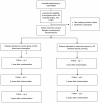The effect of problem-based learning in patient education after an event of CORONARY heart disease--a randomised study in PRIMARY health care: design and methodology of the COR-PRIM study
- PMID: 23164044
- PMCID: PMC3528480
- DOI: 10.1186/1471-2296-13-110
The effect of problem-based learning in patient education after an event of CORONARY heart disease--a randomised study in PRIMARY health care: design and methodology of the COR-PRIM study
Abstract
Background: Even though there is convincing evidence that self-care, such as regular exercise and/or stopping smoking, alters the outcomes after an event of coronary heart disease (CHD), risk factors remain. Outcomes can improve if core components of secondary prevention programmes are structurally and pedagogically applied using adult learning principles e.g. problem-based learning (PBL). Until now, most education programs for patients with CHD have not been based on such principles. The basic aim is to discover whether PBL provided in primary health care (PHC) has long-term effects on empowerment and self-care after an event of CHD.
Methods/design: A randomised controlled study is planned for patients with CHD. The primary outcome is empowerment to reach self-care goals. Data collection will be performed at baseline at hospital and after one, three and five years in PHC using quantitative and qualitative methodologies involving questionnaires, medical assessments, interviews, diaries and observations. Randomisation of 165 patients will take place when they are stable in their cardiac condition and have optimised cardiac medication that has not substantially changed during the last month. All patients will receive conventional care from their general practitioner and other care providers. The intervention consists of a patient education program in PHC by trained district nurses (tutors) who will apply PBL to groups of 6-9 patients meeting on 13 occasions for two hours over one year. Patients in the control group will not attend a PBL group but will receive home-sent patient information on 11 occasions during the year.
Discussion: We expect that the 1-year PBL-patient education will improve patients' beliefs, self-efficacy and empowerment to achieve self-care goals significantly more than one year of standardised home-sent patient information. The assumption is that PBL will reduce cardiovascular events in the long-term and will also be cost-effective compared to controls. Further, the knowledge obtained from this study may contribute to improving patients' ability to handle self-care, and furthermore, may reduce the number of patients having subsequent CHD events in Sweden.
Trial registration: NCT01462799.
Figures
References
-
- Graham I, Atar D, Borch-Johnsen K, Boysen G, Burell G, Cifkova R, Dallongeville J, De Backer G, Ebrahim S, Gjelsvik B, Herrmann-Lingen C, Hoes A, Humphries S, Knapton M, Perk J, Priori S, Pyorala K, Reiner Z, Ruilope L, Sans-Menendez S, Scholte Op Reimer W, Weissberg P, Wood D, Yarnell J, Zamorano J. European guidelines on cardiovascular disease prevention in clinical practice: executive summary. Eur Heart J. 2007;28:2375–2414. - PubMed
-
- The National Board of Health and Welfare. Official statistics of Sweden - Statistics - Health and Medical Care. Stockholm; 2009. Myocardial infarctions 1987–2007. http://www.socialstyrelsen.se/publikationer2009/2009-12-7.
-
- De Backer G. New European guidelines for cardiovascular disease prevention in clinical practice. Clin Chem Lab Med. 2009;47(2):138–142. - PubMed
-
- Everly M, Heaton P, Cluxton RJ. Beta-blocker underuse in secondary prevention of myocardial infarction. Ann Pharmacother. 2004;38(2):286–293. - PubMed
Publication types
MeSH terms
Associated data
LinkOut - more resources
Full Text Sources
Medical



